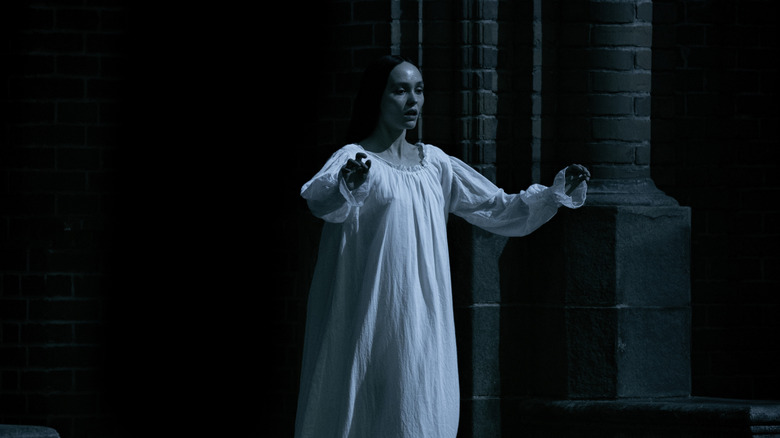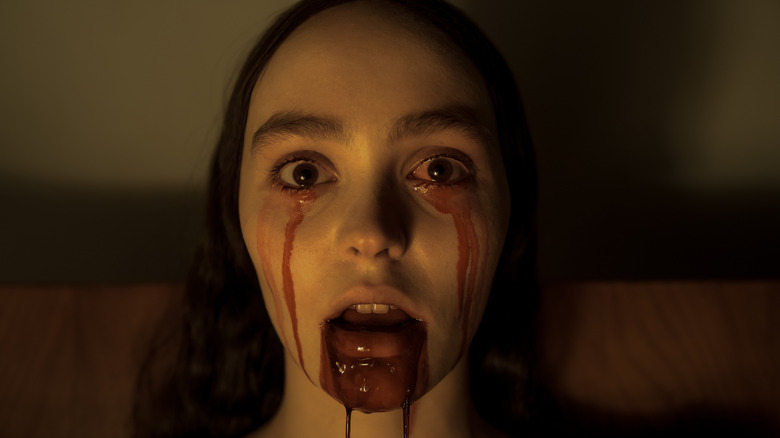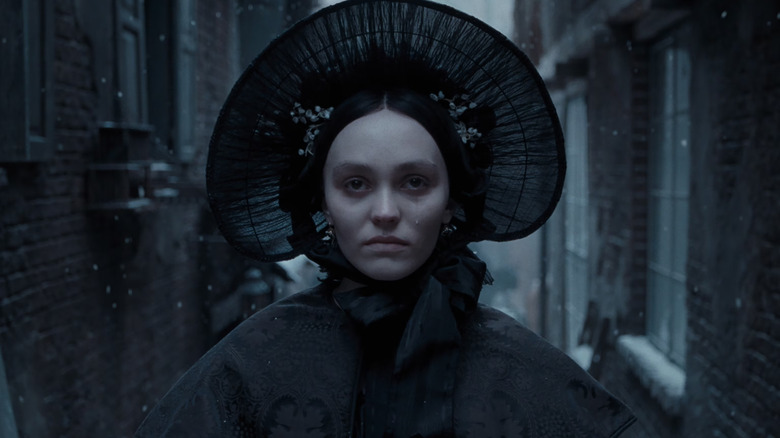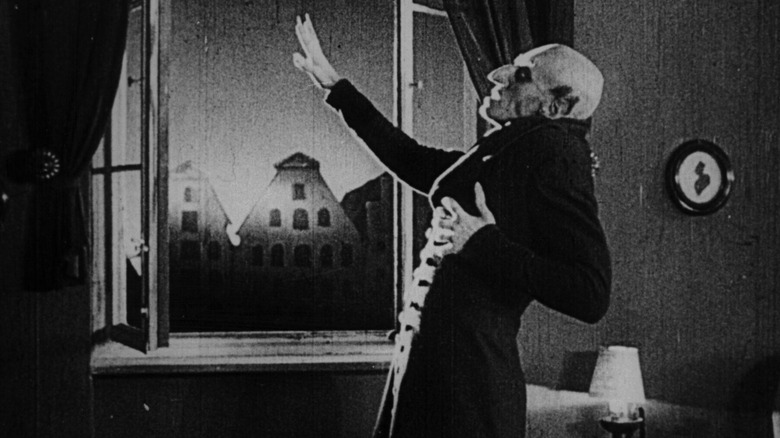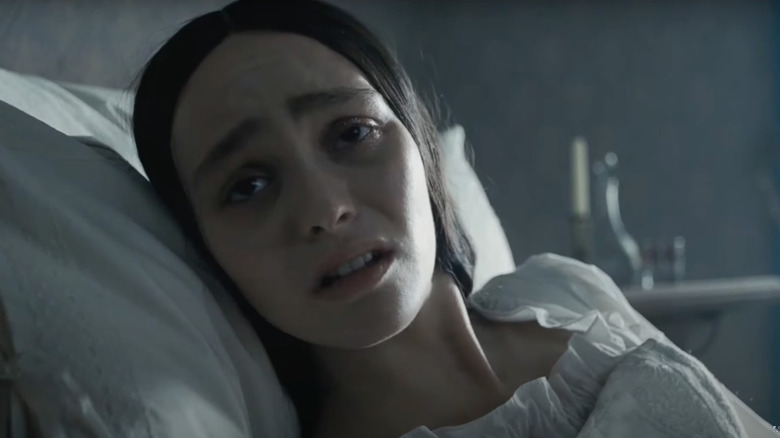Nosferatu Ending Explained: Amor Fati
This article contains full spoilers for "Nosferatu."
The concept of fate, a predestined path which has been laid out for each of us, is a terrifying one. We all have (or at least appear to have) free will, and we all cherish freedom as a precious, enviable, coveted thing. Thus, fate is the antithesis of all our hopes and desires, a monolithic force that we are powerless to change or stop. This is why the concept tends to be de-emphasized in our culture, with everything from our aspirations as children to our goals in adulthood being put in the context of free will: we're told that all we want is potentially within our grasp, that dreams can be achieved, and that paths can be changed. Fate, then, is typically invoked for purposes of a scapegoat when things go wrong. Even with that perspective, it's never seen as a force of immovable doom, merely an obstacle that can be sidestepped.
Yet some people throughout history don't diminish fate to the level of mere nuisance, nor do they view it as something bleak and terrifying (at least, not exclusively). The concept of "amor fati," a love of fate, takes the pithy notion of "everything happens for a reason" and elevates it to a more grandiose status of acceptance. This version of the belief was most famously espoused by the German philosopher Friedrich Nietzsche, who spoke at length about the topic in his 1888 book "Ecce Homo." Perhaps there was some quality to 19th-century Europe which caused Nietzsche to have such feelings, some combination of his religious upbringing and the world he observed around him.
Whatever the case, the idea of "amor fati" is one that's both freeing and condemning, a concept that allows the believer victory even in defeat. That idea is at work in Robert Eggers' film of "Nosferatu," set in 1838 Germany. It's a movie that treats the titular creature of the night, a vampire, as part individual, part force of nature. The vampire's coming is foretold and nearly unstoppable, as is his reign of terror. However, if one heroine, a woman seemingly chosen by the creature, if not by fate itself, can bring herself to literally embrace her fate, then there is hope for humanity. In the eternal struggle between Good and Evil, we all have a part to play.
The fateful connection between Ellen and Orlok
Most horror stories involve some type of fateful transgression, a moment where a character goes into a place they're not supposed to, reads a cursed book, plays with a forbidden box, and so on. "Nosferatu" announces that it's going to be a story about a fateful connection instead from its opening moments, which sees Ellen (Lily-Rose Depp), a woman living in Berlin, visited in a dream (or is it?) by the disembodied spirit of the ancient Transylvanian vampire known as Count Orlok. Despite fervently saying her prayers, Ellen cannot escape Orlok's arrival. There's a sense that Orlok and Ellen supernaturally realize their fate being intertwined from the start — Orlok observes that Ellen is "not meant for the living," as he lavishes attention on her that is simultaneously painful, repulsive, and orgasmic.
Years after this first encounter (which, again, may have been real, or may have been a supernatural premonition), Ellen and her new husband, Thomas Hutter (Nicholas Hoult), are tricked into helping Orlok travel from his native land into metropolitan Germany, enacting a version of the tale we've seen before in F.W. Murnau's 1922 "Nosferatu" and the many adaptations of Bram Stoker's "Dracula" novel, which "Nosferatu" is based upon. Both the forces of Darkness, represented by Thomas' boss, the occultist, Orlok-worshipping Herr Knock (Simon McBurney), and Good, represented by Prof. Albin Eberhart Von Franz (Willem Dafoe), seem in on the Ensurance Trap meant for Ellen, to borrow a phrase from "Donnie Darko," another film about a doomed protagonist whose sacrifice saves many.
It turns out that Ellen's fate is to enrapture Orlok long enough to allow the only thing that will destroy him, sunlight, to take him by surprise. As both she and Von Franz come to realize, this means that she has to allow Orlok to have her body, in every way possible (but most specifically, to sink his fangs into her heart and suck her blood), in order to keep him distracted while dawn breaks. This she does willingly, aided by Von Franz taking her husband Thomas and her physician Dr. Sievers (Ralph Ineson) on a wild goose chase, gaslighting them into believing they're going to kill Orlok in his sarcophagus, where they end up killing the nearly-vampiric Knock instead. Ellen and Orlok end their fateful connection the way they began it: with Orlok climbing into bed with Ellen, the two entwined in a moment of dark ecstasy.
The seduction of Orlok's Evil versus Ellen's resilient Good
Like other stories about protagonists with fates that they must fulfill — from "The Last Temptation of Christ" to "The Matrix" — Ellen is tempted to renounce her destiny many times over the course of the film. Ellen also seems to have some sort of extrasensory power — she knows Thomas has a landed a new job before he does, and mentions that when she was a child, she always knew the contents of Christmas presents before opening them — something which Von Franz refers to by saying that in an earlier age, she could've been a "priestess of Isis."
That power can be subverted by Orlok's Evil, however, as a battle rages within Ellen ever since her first encounter with the vampire. This battle manifests itself externally as a sort of malady, something that is determined by Dr. Sievers to be both a mental and physical illness that's plaguing Ellen. Thomas and Ellen's friend Friedrich (Aaron Taylor-Johnson) and his wife Anna (Emma Corrin) view Ellen's illness as a burden that has something immoral behind it; they're not wrong, but their ignorant dismissal of it and her only leads to their family's corruption and ruin. At one point, Ellen gives into this darkness inside of her, perhaps believing that embracing that side of herself could be a potential escape. She seduces her husband and attempts to make him a sort of Orlok substitute, having him take her body in the way she knows (either literally or intuitively) the vampire wants. While this reveals that there is indeed a deviant, repressed darkness inside of Ellen and Thomas (as there is in every human being), the Good inside Ellen is too resilient to be snuffed out, and the love between the couple keeps them from losing themselves completely.
The fate of Nosferatu determined by Nosferatu
In addition to the psychosexual subtext of the story and characters, there's also a clever meta-narrative happening within "Nosferatu." One of the tenets of vampire stories is the way that myth plays a large part in just about all of them. Typically, there's a character like a Dr. Van Helsing or a Prof. Von Franz, someone who is well-versed in the lore of vampires and can advise on how to detain or kill them. In more modern vampire tales, the cinematic mythology of vampires itself is often cited, where some elements like wooden stakes and an aversion to garlic can be dismissed as Hollywood hokum, while other aspects like fangs and bloodsucking can be retained. Eggers lets his "Nosferatu" have it both ways. Obviously, the presence of Von Franz allows for the protagonists to have a little background on this movie's version of vampire mythology. While the film does not become anachronistic or break the fourth wall, it does inherently include a nod toward Murnau's film in the way Von Franz insists is the only definitive method of killing a vampire, that being sunlight.
The notion of sunlight harming or killing a vampire is something that was first introduced in Murnau and writer Henrik Galeen's "Nosferatu," making it one of the few elements not taken from Stoker's novel. As such, it was of course paramount to Eggers to keep this addition in his version of the story. Yet the emphasis on its importance — Von Franz makes clear that all other methods of killing a vampire are ineffective — carries with it a meta acknowledgement of the importance of 1922's "Nosferatu" to the history of vampires full stop. In other words, this movie's Count Orlok couldn't ever be defeated were it not for Murnau's "Nosferatu" existing, at least in a meta sense.
Ellen's fate can be seen as tragedy, or as transcendence
As far as horror movies go, even the horror movies of 2024, the finale of "Nosferatu" isn't the most ambiguous. Yet ambiguity is still present nonetheless, not in terms of the plot but of the tone and meaning. It would be fairly easy to see the film as a tragedy, a bleak tale of darkness infecting civilization, a story of the corruption of innocence and beauty, and the chronicle of the destruction of a woman and the loss suffered by those who loved her. Yet viewing the film solely from this perspective does a disservice to Ellen's sacrifice, as well as the fact that it seems Good fully triumphs over Evil as a result of her actions. Much can be made of Ellen being forced into such a deadly fate, but much also has to be made of the good that comes from her embracing that destiny.
With "Nosferatu," Eggers has made a film that encapsulates the concept of "amor fati" in a compelling, haunting, terrifying, erotic, and ultimately beautiful way. Sure, it's fun to indulge in films and entertainment featuring uncomplicated depictions of morality, but it's ultimately more nutritious to have movies like "Nosferatu" present such a complex vision of a primal, eternal conflict. Eggers understands that Evil and Good exists in all of us simultaneously, and that there is no easy, clean answer to reconcile the two. We must all accept the hand we're dealt, just as we must all accept ourselves for who we truly are. The morning sun is our enlightenment, our transcendence; we can either face it or cower from it, but, like fate, it cannot be stopped.
